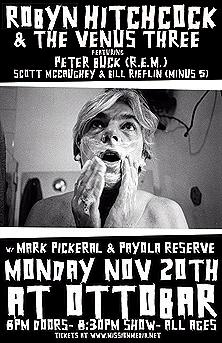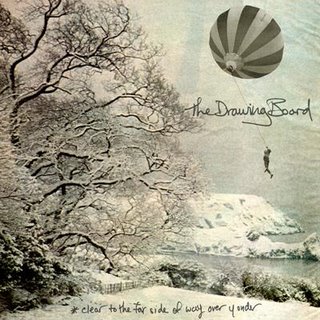Editor's Note: This was written by Stephen Kilroy from DC's Middle Distance Runner. This is part of a series of posts that they are writing today. Continue to the bottom, to link to the rest.
Hello blog. Stephen Kilroy here, with a list of my favorite lyricists! Blog blog blog blog glob!
I am choosing to focus on lyricists because most people don’t seem to give two shits about lyrics, and there’s nothing I love better than being irrelevant.
People will make up their own lyrics to songs and never bother to learn the real ones, whereas that cannot be done with a melody. That makes them interesting, whether you like it or not! I don’t think anyone knows the lyrics to
Walk This Way, for instance. (Not to say that it is at all necessary to know them. Aerosmith sucks, after all.) In fact, most people don’t bother to learn a song’s verses unless the lyrics directly relate to a bad life experience or are a prerequisite to a drinking game.
I’m so bitter.
Enough griping out of me, though. Here are my top five lyricists, each with a short description and recommended listening. Enjoy!
Bob Dylan:
The obvious first choice, he wrote and sang like a 70-year-old at age 20. A good delivery is as important as anything a lyricist writes on a page, and can ruin a song or make it great. If you don’t believe me, listen to Joan Baez’s version of any Dylan song, and you’ll see exactly how much his voice gave to the significance of a song, and how hers was a poor substitute.
Everyone and their Aunt Sally are writing songs about George Bush these days, but somehow a verse that
Bob Dylan wrote 40 years ago is more relevant than any of them. It looks like this:
Yes my guard stood hard when abstract threats
Too noble to neglect
Deceived me into thinking
I had something to protect
“Good” and “bad”, I define these terms
Quite clear, no doubt, somehow
Ah, but I was so much older then
I’m younger than that now.
-Bob Dylan -
My Back Pages Maybe it’s not universally applicable. Maybe I fall into the category of people who want lyrics that they apply to the way they feel. Who knows. All I’m trying to say is that the man wrote this when he was 23, and it’s something that will apply in perpetuity, throughout the universe.
Additional listening:
The Lonesome Death of Hattie CarrolStephin Merritt:
The singer/songwriter/frontman of
Magnetic Fields. Merritt is alternately (and sometimes simultaneously) cynical, hilarious, depressing, and uplifting. His lyrics can alternate between clever bitterness and sweet sincerity in a line. Examples:
I had a dream and you were in it,
The blue of your eyes was infinite,
You seemed to be,
In love with me,
Which isn’t very realistic.
-Magnetic Fields -
I Don’t Believe YouOh you may not be beautiful,
But it’s not for me to judge,
I don’t know if you’re beautiful,
Because I love you too much.
-Magnetic Fields -
Asleep and DreamingHis rhyme schemes range from the very simple (see above), to the very complex. Sometimes, entire lines rhyme with each other. Sometimes, a rhyme takes a whole verse to resolve. In other songs, such as those quoted above, he structures verses almost like children’s rhymes. The choice usually depends on the subject matter, the latter being used for his more sincere, affectionate songs. His attention to this sort of device always impresses me on a technical level.
Merritt’s matter-of-fact tenor gives the listener the sense that he is exhausted by his own superiority much of the time, but if you can stand his listless delivery, his lyrics are a lot of fun to listen to.
Additional listening:
I Wish I Had An Evil TwinRobert Plant:
Sexual white boy blues + Lord of the Rings references? Fuckin’ awesome.
Recommended listening:
Led Zeppelin -
Ramble OnSufjan Stevens:
His delicate enunciation and deliberate word-choice have literally stunned me from time to time.
Sufjan Stevens is another lyricist whose voice is the perfect accompaniment to his message. Whether a song is about God, his mother, or a murderer, his timbre sounds fragile but sage. His voice allows him to hover above his subjects. There is never a tone of self-righteousness, however. Usually, his lyrics are merciful or sad instead of angry, even when anger is justified. About his mother, Sufjan sings:
We saw her once last fall,
Our grandpa died in a hospital gown,
She didn’t seem to care,
She smoked in her room and colored her hair.
And I was ashamed,
I was ashamed of her.
-Sufjan Stevens -
RomulusHis quiet, sad superiority is much more palatable than Stephin Merrit’s self-pity, in that it represents a lyrical shaking of the head, as opposed to a wag of the finger. Another example, this time about John Wayne Gacy:
And in my best behavior,
I am really just like him.
Look beneath the floorboards,
For the secrets I have hid.
-Sufjan Stevens -
John Wayne Gacy Jr. He says it with such pity and sadness that the listener simultaneously feels sorry for the subject and the singer. His voice and his choice of words give him the power of a savior, the power to condemn, forgive, and accept blame in a single verse. And it’s believable.
I saw Sufjan Stevens perform at Mercury Lounge in New York (where we played our first NYC gig!), and I had never heard him before. His voice and lyrics put me in a daze, and when he played
Romulus as an encore, it was probably the most moving performance I’ve ever seen in my life.
Additional listening:
To Be Alone With You,
Flint (For the Unemployed and Underpaid)
Sam Beam:
Armed with a paternally comforting voice and a former cinematography professor’s (he was one) sense of imagery, Sam Beam (A.K.A.
Iron and Wine) knows how to set a scene. Similar to Sufjan Stevens in subject matter (mostly God, family, and geography), Beam’s lyrics are usually much less abstract, and thus much more accessible. Unlike Stevens, Beam sounds very earthly, singing about mud and church doors as if you were both standing in front of them, him describing them to you. Like Stevens, however, he can cripple you with a single, devastatingly poignant line:
Mother I made it up from the bruise on the floor of this prison,
Mother I lost it all of the fear of the Lord I was given ,
Mother forget me now that the creek drank the cradle you sang to,
Mother forgive me I sold your car for the shoes that I gave you.
-Iron & Wine -
Upward Over the MountainHe even makes a point of portraying Jesus Christ in the form of a humble Mexican child:
Naked, the Judas in me
Fell by the tracks, but he lifted me high
Kissing my head like a brother
And never asking why.
-Iron & Wine -
Jesus, the Mexican BoyIt’s enough to make you want to believe in God.
Sufjan Stevens taught me how to write abstractly, about things I have never seen. Sam Beam taught me how to write about things that everyone sees, but nobody notices. His metaphors are often simple and straightforward (“slept like a bucket of snow”, “woke like a tree full of bees”, both lines from
Sodom, South Georgia), but they come across like universal truths, never poetic hyperbole.
Additional listening:
Southern Anthem,
Muddy Hymnal,
Passing AfternoonSo there it is. Now that I’m finished, I realize the one thing that all of these people have in common is that they created voices (both literal and in their writing) that could be believed. If I can’t believe a singer, whether he’s singing about God or mom or Hobbits, I don’t much care to listen to them over and over. Lyrics, for me, are as much about the performance as the words, and each one of these lyricists is a great performer in addition to being a great writer.
All the while, you get the sense that they understand something about their subject that you don’t understand. I think that to be a great lyricist, you have to know what you’re talking about, or at least how you want to say something. That’s why I try to sing about what I know, like babies, legs, hurricanes, slates, air, fog, beds, dens, husbands, eyes, rubble, human sacrifice, planes, flames . . .
Check out the rest of MDR's Mutiny:IntroChoose Your Own Adventure ExtravaganzaIan's Loves and HatesStephen's LyricistsContestPrevious Versions of The Midweek Mutiny:What Is This?Faster Faster Harder HarderSaturnaLow Red LandCan Joann





























